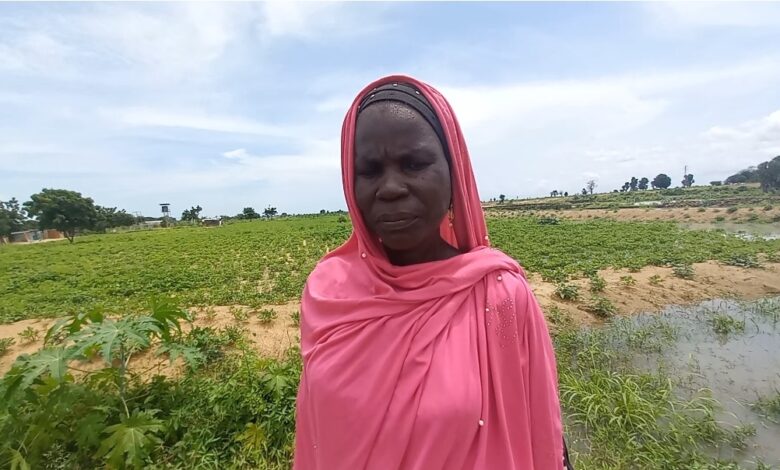Flood Washes Away Farmlands In Borno
Torrential rains in Borno state has this year caused flooding to submerge farms, as local subsistence farmers are left worrying about possible poor harvest and food scarcity.

Justina Augustine, a widow and mother of eight, was in a dismal mood as she stood, ankle deep, in the pool of water that flooded her bean and peanut farm on the outskirts of Bama, in Borno state, Northeast Nigeria.
Widowed five years ago, 50-years-old Mrs Augustine now has to plough about half an acre of land with the support of her kids. They cultivate the farm manually.
Originally from Pulka town in Gwoza local government, Mrs Augustine said she moved to join her husband, who was serving as a policeman in Bama, about 25 years ago.
“We have been living with my family here in Bama until five years ago when Boko Haram terrorists attacked and killed him while he was on duty,” she said.
“Since then, we have relied on the food we grow from our little farming to feed and take care of our needs.”
Mrs Augustine said she used to grow varieties of cereal crops to augment her yields, but the military ban on growing towering crops, as a security measure, now restricts their cultivation of various crops.
“We used to cultivate crops like rice, millet, and guinea corn; but that was until when the military here banned us from growing towering crops on the excuse that such crops give a shield to the terrorists to ambush them or attack the communities,” she said.

“So, since then, we are only allowed to plant short-stemmed or crawling crops like groundnut, soybeans, and beans, and that has reduced our access to a variety of foods.
Mrs Augustine said her role in the family changed following the death of her husband as she had to assume the breadwinner position.
“The farm has been our primary source of sustenance during the wet and dry season, but here we are this year with all that we worked for in the past three months being washed away by the flood.
“We don’t know why the river overflowed this year because this is the first time we are experiencing this in 25 years. The rains have been the usual downpour, and we thought by August, the torrents would lessen so that the peanuts and beans would get more sun to mature. But here we are, having the flood overflowing the farmlands,” she said tearfully.
The experienced farmer said once the crops are submerged in water for days, the chances of expecting good yields are significantly reduced.
Mrs Augustine’ story exemplifies the plight of most farmers who cultivate in the flat lands of the central district of Borno state, where the flood washing over the plantation is endemic.
Around Maiduguri, the Borno state capital, hundreds of farmers who cultivated at the city’s outskirts and other safe locations had their farms flooded and washed away.
Abdulmuminu Bulama, one of the commanders of the Civilian-JTF operatives in Borno state, who are assigned to provide security at the government Mega Farm sites, said he worries over possible food shortage in the coming months.
“Every morning, in the past two months, we clear thousands of farmers – men, women and young adults who go out of the city to their farms or as labourers in plantations,” he said.
“Since the insurgency, we have never had such a large turnout of people trooping out to farms like this year, but sadly the efforts may be futile due to excessive downpour,” he said.
“Many of the farms have been flooded, and we have seen farms being washed away – and that has dampened the hope for a bumper harvest. The rains started earlier this year, and we were all happy that the disaster caused by the sudden seizure of rains in August last year would make up for the loss of the previous year.
“If the rains could wash away over 80 houses on the coastal areas around Maiduguri, can one imagine the extent of its devastation on the farmlands?
Support Our Journalism
There are millions of ordinary people affected by conflict in Africa whose stories are missing in the mainstream media. HumAngle is determined to tell those challenging and under-reported stories, hoping that the people impacted by these conflicts will find the safety and security they deserve.
To ensure that we continue to provide public service coverage, we have a small favour to ask you. We want you to be part of our journalistic endeavour by contributing a token to us.
Your donation will further promote a robust, free, and independent media.
Donate HereStay Closer To The Stories That Matter




